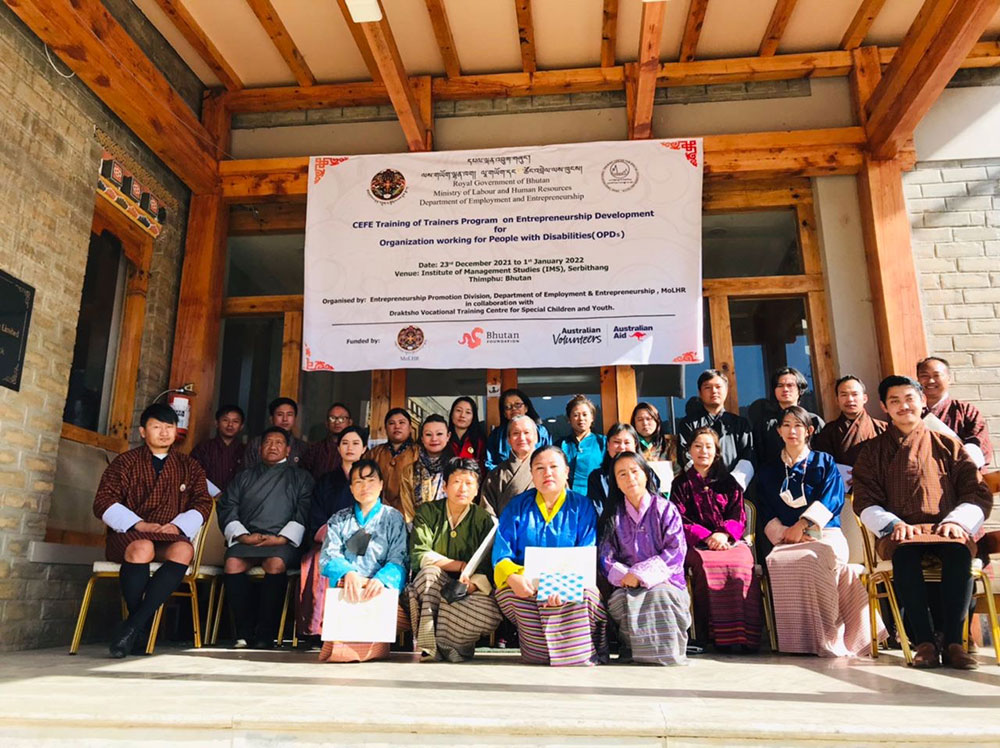Yangyel Lhaden
To equip persons with disabilities (PwDs) with entrepreneurship and vocational skills, trainers were trained on entrepreneurship development skills.
The first training of trainers (ToT) on entrepreneurship development for organisations working for PwDs ended last week.
A total of 17 participants working with PwDs from Draktsho, Muenselling Institute, the Bhutan Stroke Foundation, the Special Education Needs school, and Phensem took part.
The training was organised by the Entrepreneurship Promotion Division under the Ministry of Labour and Human Resources (MoLHR) in collaboration with Draktsho Vocational Training Centre for Special Children and Youth funded by Australian Volunteers, Australian Aid, Bhutan Foundation, and MoLHR.
Department of Employment and Entrepreneurship project officer Jigme Thinley said that as per the Population and Housing Census of Bhutan 2017, two percent or 15,567 persons of the population in the country were living with disabilities.
Jigme Thinley said, “It’s high time to take these initiatives to unlock PwDs entrepreneurial potential for meaningful employment. Such initiatives will bring the marginalised group into the mainstream job market.”
He said that it was the MoLHR’s mandate to make the labour market inclusive for PwDs according to the philosophy of Gross National Happiness, Constitution, and National Policy for Persons Living with Disabilities 2019.
The National Policy for Persons living with Disabilities 2019, under policy intervention Section 9.1: Employment and 9.2 Support and Enabling Environment for business opportunities mandate the MoLHR to promote inclusive employment.
During the entrepreneurship development training the participants were trained using competency-based economics through the formation of enterprises ( CEFE) methodology.
Jigme Thinley said that CEFE adopted a comprehensive set of training instruments and uses experiential learning methods to develop and enhance business management and personal competencies, mostly in the context of income and employment generation and economic development. “They are also taught risk management in business.”
He said that with this methodology participants are actively engaged with simulation exercises, role plays, field studies, and experience sharing, rather than facilitators spoon-feeding participants. “There are fewer lectures and more experiential and action-oriented learning exercises.”
Principal and Teacher of Draktsho East Karma Garab Dorji and Thinley Wangmo developed a tailoring business in Kanglung as part of the training.
Karma Garab Dorji said that tailoring skills were provided to Draktsho East to PwDs and he was looking forward to using his entrepreneurship skills from the training to explore the market potential of opening a tailoring shop in Kanglung for his students.
Bhutan Stroke Foundation Executive Director Dawa Tshering said the training was very different and useful, and he was looking forward to sharing his knowledge with PwDs. “I am thankful to the facilitators for making a complex training simple enough for us to understand.”
Draktsho is going to develop an inclusive entrepreneurship curriculum for organisations working for persons living with disabilities and integrate entrepreneurship subjects in Draktsho Curriculum.
Department of Employment and Human Resources Director General Kunzang Lhamu said that TVET reforms included making TVET inclusive for PwDs. “We are in the initial stage of planning to make TVET inclusive.”
She said that infrastructures in TVET centres and a curriculum for PwDs in TVET centres will be developed to make TVET inclusive.


